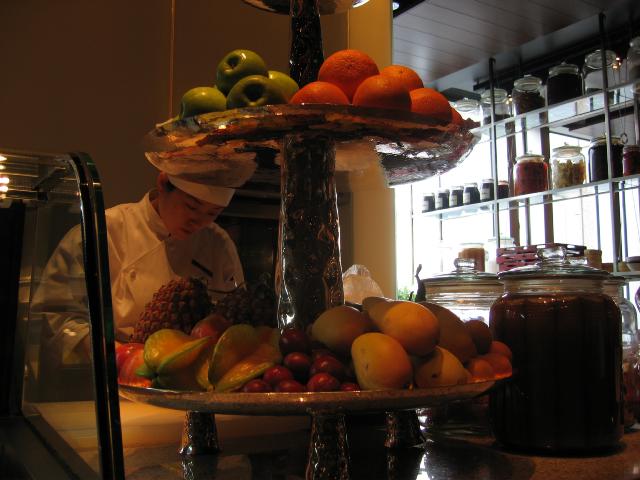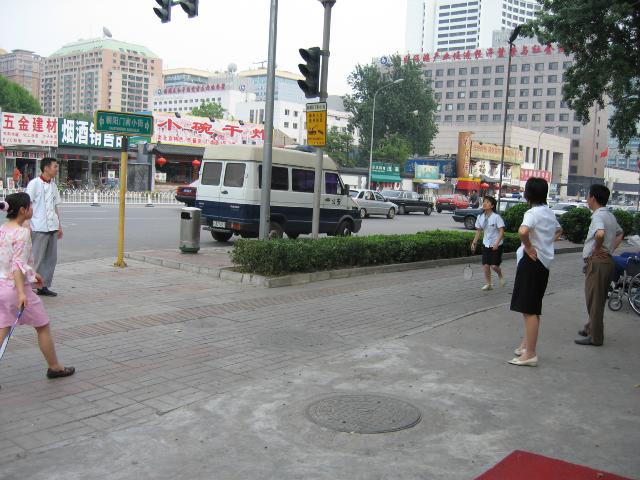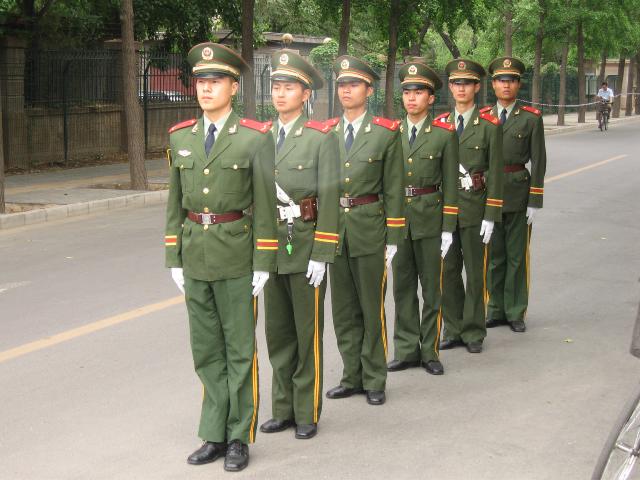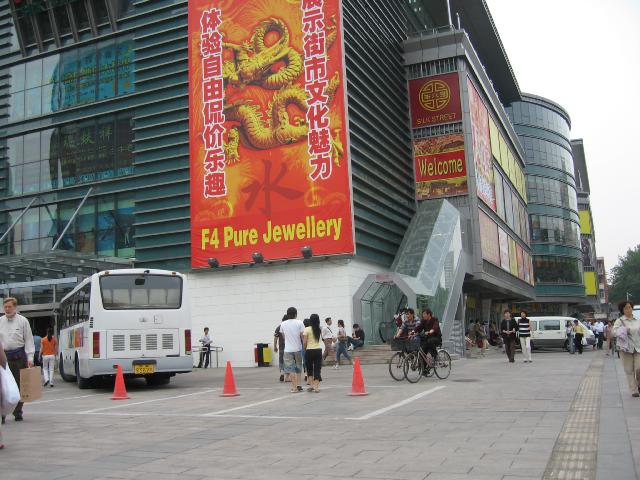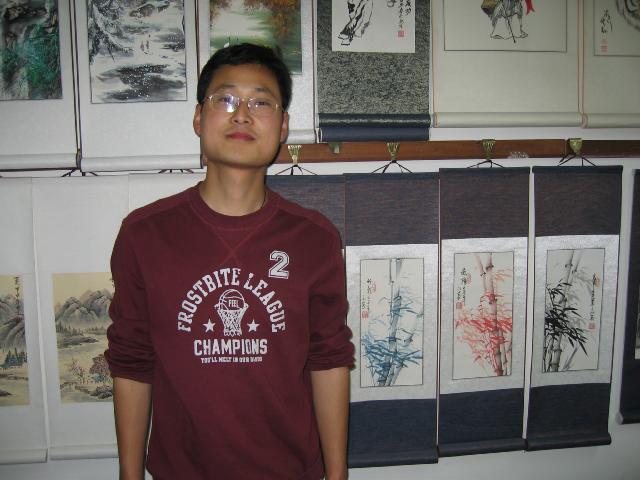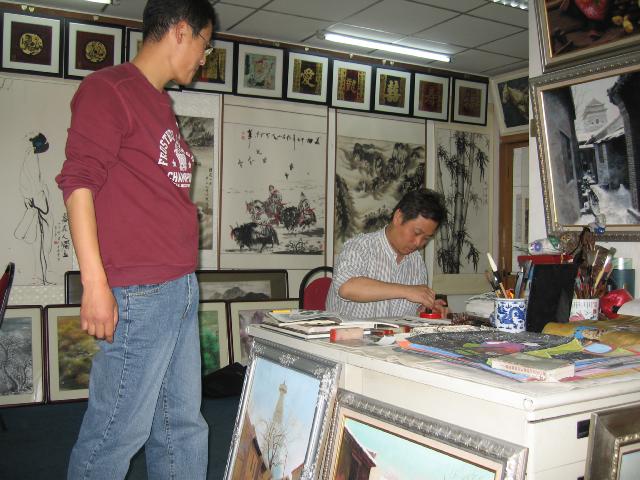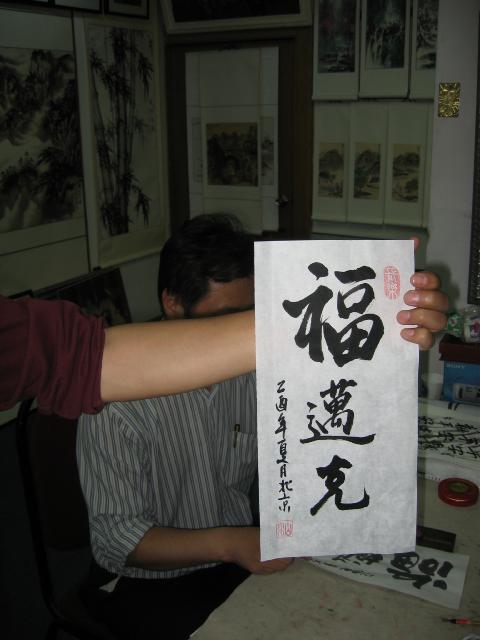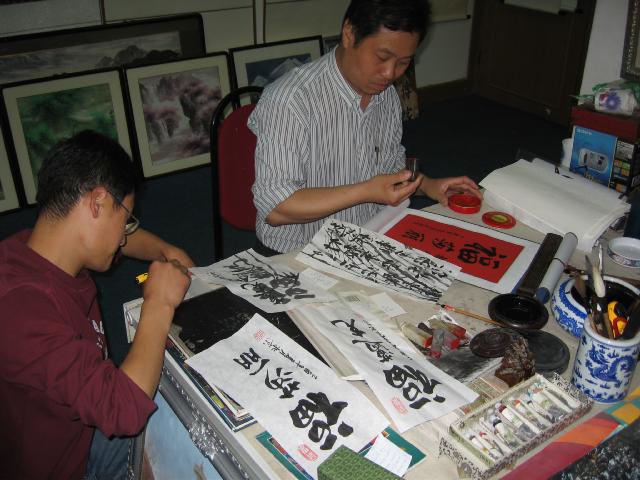05/5/20 (Friday): Coincidence...? I think not.
Friday the 20th was my last day in Beijing, and I’d deliberately left it open. I had a workout in the morning (the swimming pool at the Hyatt is pretty posh, lush with plants, surrounded by sculptures, and more like something out of a jungle island resort than the basement of the Grand Hyatt). The spa is small but luxurious. A pair of polite girls at the desk manage your sign-in on arrival, and secretly push the elevator button for you as you depart.
Anyway, after sweating I treated myself to lunch at the hotel restaurant — “Made In China.”
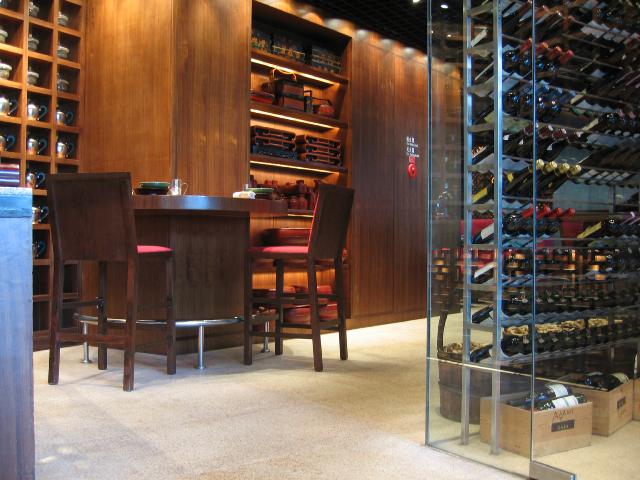
Made In China: fancy decor and great food.
It was much, much better than the silly name sounds. Actually, it was fantastic. Lunch was about 250 yuan, and consisted of about 8 little plates of stuff — chicken with peanuts, fried tofu with chili peppers, eggplant, some wok-fried veggies, asparagus, bok-choy in a thick peanut and sesame sauce, and that sort of thing. The decor in the place was modern but really lovely — glass cases filled with trays of ripe vegetables; a large glass “cave” full of wine (the Petrus was prominent), and all the chefs worked in the open at long bars in full theatrical view. Just behind me was a dessert bar, where a young lady was slicing (or really, sculpting) fresh fruit.
After lunch I walked across the lobby — and bumped into Nicholas Negroponte. “I’m like a bad penny,” I said, “I just keep turning up.” Of all the gin joints... I think we were both a bit surprised. (Coincidence...?) Nick was waiting to see the Beijing-based head of AMD, the microprocessor company that are among the sponsors of his $100 laptop effort. And I was on my way out for an overdue long walk around Beijing.
The Temple of Heaven was closed for renovation, and the Forbidden City was in scaffolding, both being scrubbed up in preparation for the 2008 Olympics. But I’d seen them before. Instead, I planned a long walk around the city with strolls through the old Hutongs, Beijing’s ancient long, narrow streets lined with family houses and courtyards. See: hutong photography. They’re beautiful, and being in them makes the rest of the city disappear.
Cars far outnumber the bicycles these days, but the city still has charms. Girls played badminton on the sidewalk, and as I walked past, one of them hit a high, errant shot that bounced the shuttlecock right off the top of my head! The girls were in hysterics. It took them a long time to stop laughing.
Walking past a row of embassies, I ran into some platoons of white-gloved soldiers parading around. As a western person, a laowai, I was still a real oddity.
I thought I’d check out the big silk shop, Xiushui which used to be a long street jammed with little shops. The area used to be called “Silk Street.” But that’s been torn down and stuffed into an ugly single-building mall. A large parking lot brings busload upon busload of tourists to buy copycat designer shirts.
A couple of tailor shops do 24-hour work, but that’s not the place to have suits made. What a waste of time the whole joint was. As I left, I had to fend off touts in the parking lot, hawking socks, Polo shirts, and pirated DVD’s. It was about 5pm and the hotel was a good half hour walk. As soon as I hit the sidewalk, a pretty girl stuck to me like a leech, opening box after box of fake Rolex and Rado watches. “Only 200 Yuan” she said. This girl was stubborn, but not as stubborn as me. I showed her all of my timepieces — a Treo phone with world time, a Canon camera with local clock, a Panerai wristwatch, the three clocks in view on giant buildings around us. “OK, OK, only 150 Yuan!” She was not letting go. In fact, she stuck with me for about half a mile as the price dropped to about 100 Yuan. She asked me what price I wanted to pay. I asked her how much it would cost when we reached Tiananmen Square in about an hour. She laughed and gave up. As soon as she left, a skinny young man wearing a “Frostbite League” sweatshirt took her place and began asking questions.
He was very polite and asked where I came from, what I did, and so on. He said he was a third-year student in art school, working to master traditional Chinese calligraphy and brush painting. He asked if I wanted to visit his studio nearby. Now, I’ve been in plenty of situations like this and can smell a pick-up artist a mile off. But he seemed honest. So I asked him what he was going to do after graduation, since being an artist is so impossible. He said his aim was to teach traditional art in middle school: he said he loved students and wanted to pass on what he had learned from his masters. That was all I needed to hear. “My name is Kevin Li,” he said. I’ll never get used to the habit of picking silly western first names.
We walked back through an alley, into a nondescript building, and took the elevator to the third floor. Then down the hall and into the small studio.
The walls were completely covered with beautiful paintings. Kevin’s teacher was seated at a small desk with a pot of ink, working. Calligraphy is pretty common in China, but this was where the real work happens: beautiful pieces, honest and in a place of humble teaching and learning.
Many of the pieces are traditional scripted subjects — scenes along the Yangtse, bamboo forests, the simple life is the happy life, and more. And there were special not-so-traditional things.
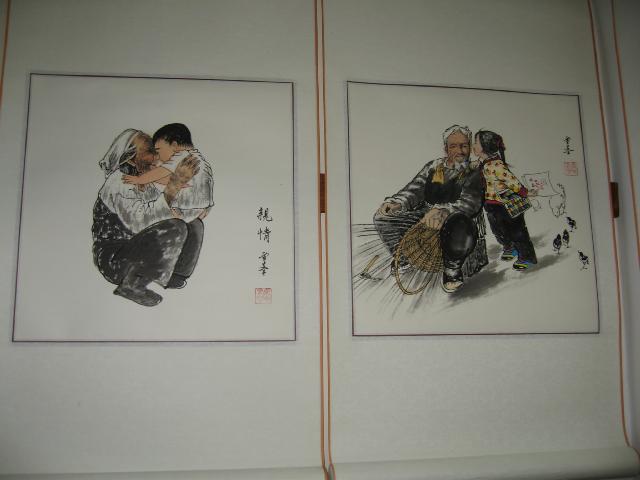
Traditional grandparent/grandbaby pictures. The girl got a 100 in her schoolwork and is telling her grandfather.
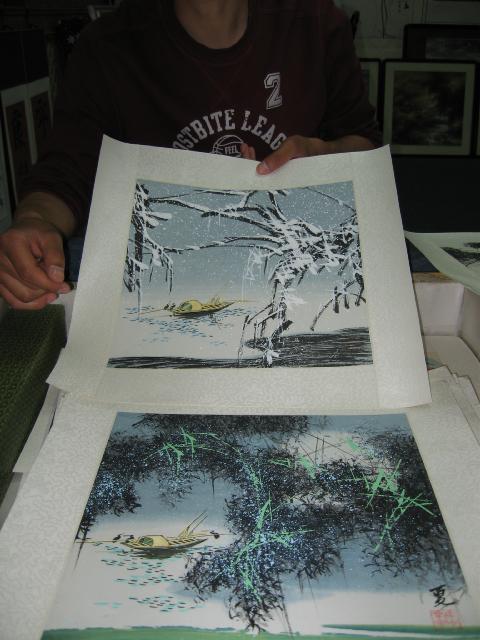
Kevin shows his "Four Seasons" paintings.
Kevin began showing me his portfolio of work — traditional subjects, calligraphic pieces, silk paintings done with superfine weasel-hair brushes. His teacher wrote my name in two characters as a present.
Kevin explained that his school had a partnership with the Chicago Art Institute (one of the best art schools in the US), and that he and his teacher were going there for the month of June. I told him I would be there June 26-27 presenting our giant Bhutan book at a conference. We swapped email addresses and promised to connect.
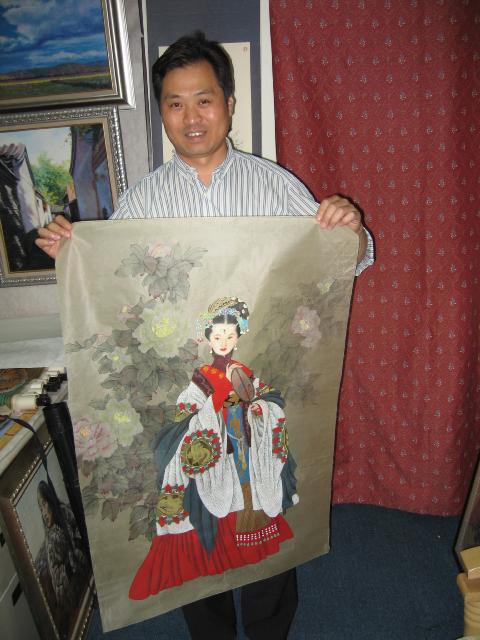
Kevin's teacher with a spectacular silk painting.
Looking through his portfolio, I asked Kevin if he could part with a set of drawings. I chose his “Four Seasons” pictures and asked him how much money I could give him. I gave him quite a bit more than he asked, and told him to spend it on good meals in Chicago. I’ll see them there.
That evening a group of 8 of us went out to dinner at the Red Capital Club, a wonderful speakeasy that Amy Tan had recommended. And — what luck! — they had a special mixed dinner for 8. It’s furnished with original central government stuff from the Mao era, built around a courtyard. We sat in the dining room — I sat next to a spectacular imperial dragon robe dating from the 1700’s.
On Saturday I got up early, hit the gym, and caught a taxi at 9:30 to the airport. As I got through security and into the hallway for the gates, I collided with a stewardess. I apologized profusely for being clumsy. I said knowing my luck, she was probably working on my flight. “British Air?” she said. Yep. “Flight 38?” — Yep. She asked me what my seat number was. “3D” I said. She said “My name is Catherine, and that’s the front left of my plane: it’s my section.” She explained that this was her first time in Beijing and she’d had a chance to sightsee a bit. I always aspire to be as polite and friendly as the men and women who work on planes and in hotels, and it usually pays off. (Coincidence...?)
Waving goodbye, I walked into the lounge. As I sat down, I saw a familiar face across the divider: it was my friend Simone Ross. I hadn’t seen her for two or three years. (Coincidence...?) Simone used to run the Smithsonian Discover Awards gala and had moved from Boston to New York about two years ago. She had been in Beijing to coordinate the Fortune gala that week. We had just enough time to catch up on life’s serendipities before I dashed for my flight. I was the last passenger on: Catherine was relieved.
